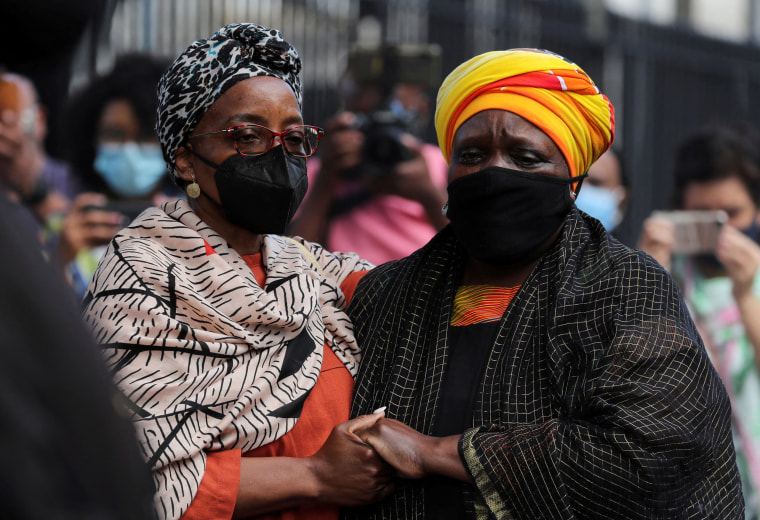CAPE TOWN — South Africans lined up for a second day on Friday to pay their respects to Archbishop Desmond Tutu, whose body lay in state at St George’s Cathedral in Cape Town where the anti-apartheid hero preached against racial injustice.
Tutu, a Nobel Peace Prize winner widely revered across racial and cultural divides in South Africa for his moral rectitude and principled fight against white-minority rule, died on Sunday aged 90. He witnessed the end of that regime and chaired a Truth and Reconciliation Commission to help unearth state-sponsored atrocities during that era.
Members of the clergy and church wardens lined the street as a guard of honor, waiting for the simple pine coffin with rope handles to arrive, while the St George’s Cathedral marching band filled the air with sounds of drums, flutes and trumpets.
Tutu, who requested the cheapest coffin and did not want any lavish funeral expense, will be cremated and his remains interred behind the cathedral pulpit, from which he often used to preach against racial injustice.
A teary Thandeka Tutu, his eldest daughter, hugged her sisters after climbing out of the hearse, meeting other family members and the clergy at the entrance where six black-robed pall bearers carried the closed coffin inside to an inner sanctuary amid a cloud of incense from an Anglican thurible.

The cathedral’s dean, Father Michael Weeder, told news broadcaster eNCA that Tutu’s body would lay in state in the cathedral through the night after the public viewing ends at 5 p.m. (10 a.m. ET).
A long line snaked around the cathedral as mourners waited to pay their respects.
“We as young activists believe the Arch stood for the same values that we want to aspire to in society,” Irfaan Mangera, a pro-Palestinian South African activist, told Reuters as he waited in the long line, draped in the Palestinian keffiyeh.
Using Tutu’s nickname, Mangera added: “The Arch was one of the figures who continuously united us against oppressive systems globally, locally and we want to continue in that path as young South African activists who emulate the values of non-racialism and non-sexism.”
Tutu's death represents a huge loss for South Africa, where many called him as “Tata” — father. Since Sunday, church bells have been rung every day in his honor and tributes and prayers have poured in from around the world.
“I am basically just here to pay my respects,” said Randall Ortel, a medical doctor and one of the first members of the public in line to enter the church on Thursday. “He is definitely one of my role models and I want to emulate what he has done in his life,” he said.
Amanda Mbikwana said she had arrived as early as 5 a.m. with her mother and nephews.
“We have known Tata’s work, he has stood up for us and we are here today in a free country to give him the honor, to celebrate his life and to support (his wife) Mama Leah and the family,” said Mbikwana, a human resources manager.
“He was always the voice of the voiceless and always the voice of reason,” said fellow anti-apartheid activist Chris Nissen, as he waited in line outside the cathedral.
Among the many mourners was Mandla Mandela, a grandson of South Africa’s first Black president, Nelson Mandela, who had been a friend and ally of Tutu.
“People like Arch were able to lead protests and marches right here in the Cape and this is why, when we look back at his life, we are celebrating today and particularly with his support for oppressed nations across the globe,” he said.
